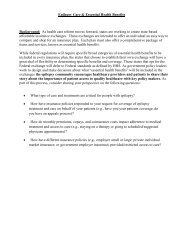Legal Rights of Children with Epilepsy in School & Child Care
Legal Rights of Children with Epilepsy in School & Child Care
Legal Rights of Children with Epilepsy in School & Child Care
You also want an ePaper? Increase the reach of your titles
YUMPU automatically turns print PDFs into web optimized ePapers that Google loves.
<strong>Legal</strong> <strong>Rights</strong> <strong>of</strong> <strong><strong>Child</strong>ren</strong> <strong>with</strong> <strong>Epilepsy</strong> <strong>in</strong> <strong>School</strong> and <strong>Child</strong> <strong>Care</strong><br />
See Chapter 8 for an alternate scenario <strong>with</strong> these facts.<br />
Case Scenario 3 — Suspension for Misbehavior<br />
Mark, a 12-year-old student <strong>with</strong> epilepsy and behavior challenges gets <strong>in</strong>to a fight <strong>with</strong><br />
another student <strong>in</strong> the school cafeteria. The assistant pr<strong>in</strong>cipal breaks up the fight and<br />
while do<strong>in</strong>g so, gets hit <strong>in</strong> the face by Mark, who was try<strong>in</strong>g to get <strong>in</strong> one last sw<strong>in</strong>g at the<br />
other student. Mark then taunts the assistant pr<strong>in</strong>cipal, say<strong>in</strong>g, “You can’t suspend me;<br />
I’m <strong>in</strong> special ed.” Mark is suspended for 15 days, and his parents seek legal assistance.<br />
Discussion and Possible Advocacy Strategy: Mark’s reliance on his special education<br />
status to protect him from suspension is misplaced; adm<strong>in</strong>istrators absolutely can suspend<br />
students <strong>with</strong> disabilities, but they must follow certa<strong>in</strong> procedures and afford students and<br />
their parents procedural safeguards <strong>in</strong> order to do so. Assum<strong>in</strong>g these procedures have<br />
been followed, an attorney or advocate becom<strong>in</strong>g <strong>in</strong>volved <strong>in</strong> Mark’s case may want to<br />
po<strong>in</strong>t out to Mark and his parents that, under the circumstances, a 15-day suspension is<br />
fairly m<strong>in</strong>imal. Many other adm<strong>in</strong>istrators would have sought an <strong>in</strong>terim alternative<br />
education placement, or even expulsion. Some adm<strong>in</strong>istrators might even have pressed<br />
charges <strong>in</strong> juvenile court. It is important to determ<strong>in</strong>e, however, if Mark’s IEP is meet<strong>in</strong>g<br />
his needs and this <strong>in</strong>cident <strong>of</strong>fers an opportunity to review his program and make any<br />
necessary changes. The follow<strong>in</strong>g advocacy efforts may assist Mark:<br />
56<br />
1) Review Mark’s records, <strong>in</strong>clud<strong>in</strong>g all discipl<strong>in</strong>e records. Is this the first<br />
suspension for Mark? If not, how <strong>of</strong>ten has he been suspended? For how many<br />
days at a time? How far apart were the suspensions? For what k<strong>in</strong>ds <strong>of</strong> <strong>in</strong>cidents?<br />
Has Mark had a functional behavioral assessment? Does he have a behavioral<br />
<strong>in</strong>tervention plan? If so, does it use positive behavioral supports and<br />
<strong>in</strong>terventions? Was the school nurse <strong>in</strong>volved <strong>in</strong> its development? Does the school<br />
staff appear to understand Mark’s epilepsy and the medications he takes, along<br />
<strong>with</strong> the relationship between the medications and his behavior?<br />
1) Because Mark’s suspension is for more than 10 days, the team will need to meet<br />
to determ<strong>in</strong>e if his behavior was a manifestation <strong>of</strong> his disability. In mak<strong>in</strong>g this<br />
determ<strong>in</strong>ation, the team will look at whether the behavior was caused by or had a<br />
direct and substantial relationship to the disability or if the behavior was a direct<br />
result <strong>of</strong> the school district’s failure to implement Mark’s IEP. The attorney or<br />
advocate should attend this meet<strong>in</strong>g. While the team will look at Mark’s identified<br />
disability <strong>of</strong> epilepsy, the attorney or advocate may want to raise the question <strong>of</strong><br />
whether Mark’s behavior challenges rise to the level <strong>of</strong> an emotional disturbance<br />
under the IDEA’s def<strong>in</strong>ition. This needs, <strong>of</strong> course, to have been discussed <strong>with</strong><br />
Mark’s family ahead <strong>of</strong> time and will depend on what evidence exists to support<br />
such a determ<strong>in</strong>ation.<br />
2) Even if Mark has not previously been identified as hav<strong>in</strong>g an emotional<br />
disturbance, his IEP should conta<strong>in</strong> academic and functional goals to meet not<br />
only his needs that result from his disability (to enable him to be <strong>in</strong>volved <strong>in</strong> and<br />
make progress <strong>in</strong> the general curriculum) but also to meet the other educational








